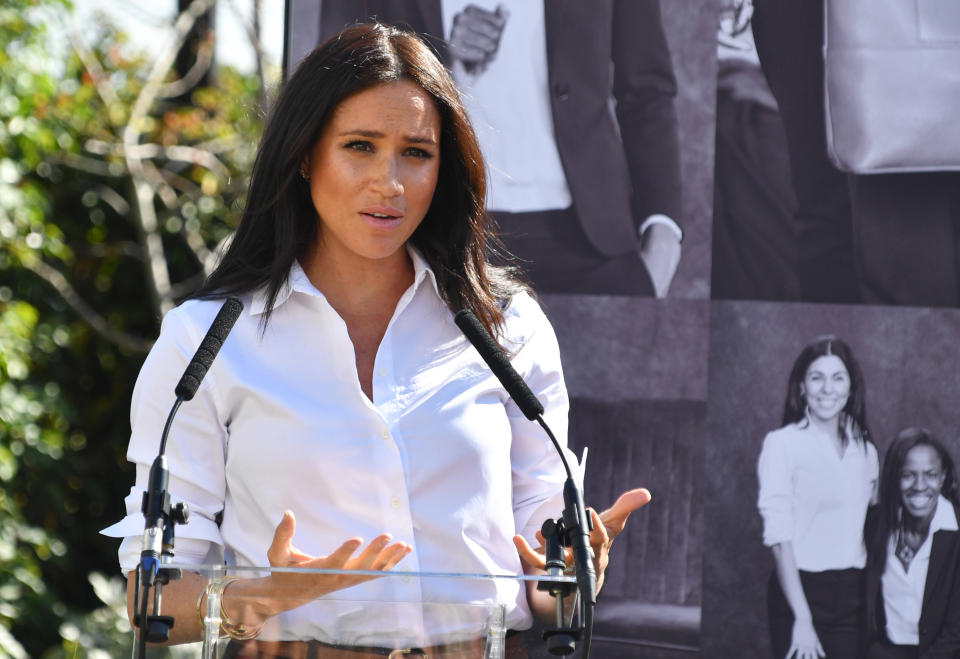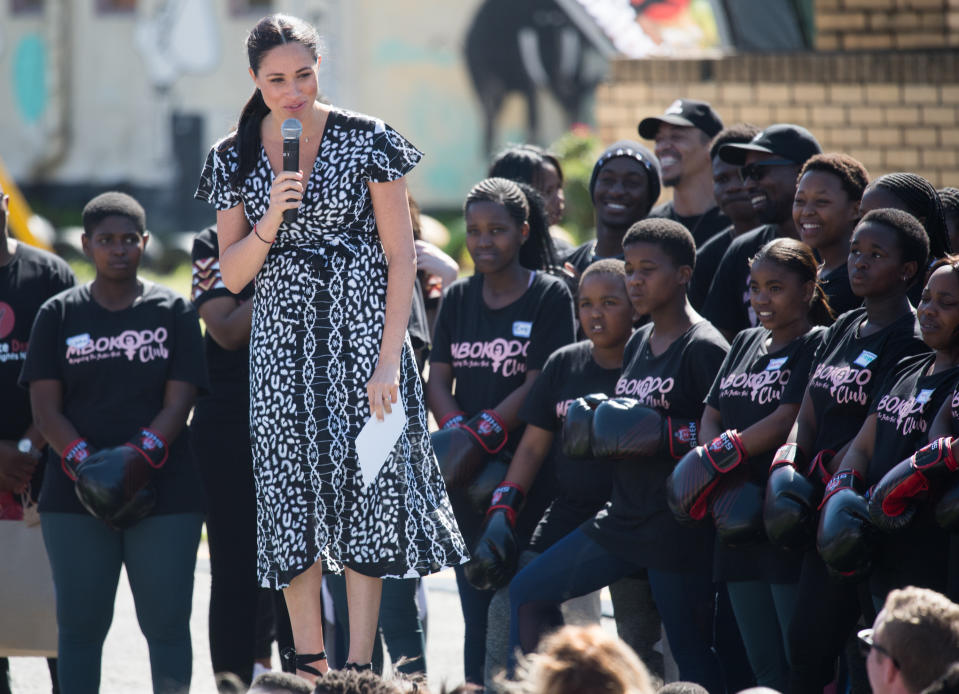Meghan Markle's history of campaigning against racism – from her early acting days to royal court cases
Meghan Markle has spoken to the graduating class of her former high school about racism amid ongoing protests in Los Angeles and across the USA following the death of George Floyd.
But it’s far from the first time the royal has spoken about race. As the daughter of a white father and a black mother, Meghan has admitted in the past to being scared to talk about her identity.
In an article for Elle in 2015, before she met Prince Harry, she said talking about green juice, pilates, and her love of handwritten notes (she is a master of calligraphy) was easier than tackling the issue of her heritage.
The former actor shared a story of being asked to fill in a form at school including her ethnicity – but not feeling as though she could comfortably tick “caucasian” or “African-American”.
She put her pen down when her teacher told her to choose “caucasian” – and her father, Thomas Markle, told her to draw her own box.
She wrote: “While my mixed heritage may have created a grey area surrounding my self-identification, keeping me with a foot on both sides of the fence, I have come to embrace that. To say who I am, to share where I'm from, to voice my pride in being a strong, confident mixed-race woman. That when asked to choose my ethnicity in a questionnaire as in my seventh grade class, or these days to check 'Other', I simply say: 'Sorry, world, this is not Lost and I am not one of The Others. I am enough exactly as I am’.”
In the same article, she added: “On the heels of the racial unrest in Ferguson and Baltimore, the tensions that have long been percolating under the surface in the US have boiled over in the most deeply saddening way.
“And as a biracial woman, I watch in horror as both sides of a culture I define as my own become victims of spin in the media, perpetuating stereotypes and reminding us that the States has perhaps only placed bandages over the problems that have never healed at the root.”
Read more: Meghan Markle shares ‘devastation’ at George Floyd’s death in speech to her former LA high school

In a resurfaced video from 2012, Meghan also addressed how people treat her because she is biracial.
She said: “Certain people don’t look at me and see me as a black woman or a biracial woman. They treat me different, differently I think then they would if they knew what I was mixed with. And I think that is – I don’t know – it can be a struggle as much as it can be a good thing depending on the people that you’re dealing with.
“I am really proud of my heritage on both sides. I’m really proud of where I’ve come from and where I’m going.
“I hope that by the time I have children that people are even more open-minded to how things are changing and that having a mixed world is what it’s all about. I mean, certainly, it makes it a lot more beautiful and a lot more interesting.”
Meghan became a global ambassador for World Vision Canada in 2016 and travelled to Rwanda for their clean water campaign.
Speaking about her humanitarian work and hinting at the racial issues which surround it, she said: “There is a myth that those who do humanitarian work have a saviour mentality, but the relationship is reciprocal.”
As a royal, she addressed her skin colour during a speech to women facing gender-based violence in South Africa.

She told them: “On one personal note, may I just say that while I am here with my husband as a member of the royal family, I want you to know that for me, I am here as a mother, as a wife, as a woman, as a woman of colour, and as your sister.”
According to the PA news agency, before marrying into the Windsor family, she shared of how her grandfather told her as a child that he and his family stopped off at KFC during a road trip, but had to go to the back of the restaurant for “coloureds” and eat the chicken in the car park.
“That story still haunts me,” she wrote. “It reminds me of how young our country is.
“How far we’ve come and how far we still have to come.”
Read more: 'Nervous' Meghan Markle delivered anti-racism speech with no notes, says friend
Meghan’s continuing court case with the Mail On Sunday and the MailOnline also addresses issues around race.
In court documents addressing the articles written about her, particularly as she was described as being “straight outta Compton”, she said: “The fact that the Defendant chose to stereotype this entire community as being 'plagued by crime and riddled with street gang' and thereby suggest (in the first few days of her relationship being revealed) that the Claimant came from a crime-ridden neighbourhood is completely untrue as well as intended to be divisive.
“The Claimant will also refer to the fact that the article cites her aunt as living in 'gang-afflicted Inglewood' in order to bolster this negative and damaging impression of where this (black) side of her family is said to come from.”
While Harry and Meghan may have stepped back from their roles as senior royals, they are still the president and vice-president respectively of the Queen’s Commonwealth Trust.
The trust shared a Martin Luther King Jr comment on Twitter amid the protests, and wrote: “Young people are vital voices in the fight against injustice and racism around the world. As a global community of young leaders we stand together in pursuit of fairness and a better way forward. Silence is not an option.
“We all have the power to effect positive change. It is time to speak up and speak out. Time to have uncomfortable conversations with ourselves and with others. Time to educate ourselves and unlearn. Time to come together and build a better future as one.”


